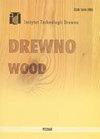木质生物质烘烤的数学模型
IF 0.9
4区 农林科学
Q3 MATERIALS SCIENCE, PAPER & WOOD
引用次数: 0
摘要
在能量利用之前,焙烧用于初始生物质增值。所制生物炭具有高能量密度、高热值的特点。此外,它含有较少的水分,并具有疏水性。因此,该技术正在发现前景,但工艺参数与生物质和生物碳性质之间的关系仍有待优化。所提出的工作显示了木质生物质颗粒烘烤的数学模型。研究了工艺参数(工艺温度和保留时间)、生物质特性(密度、生物质热值)和生物碳热值之间的依赖关系。已经确定了i度多项式函数的参数,允许估计所需的保留时间或所需的工艺温度以达到期望的生物碳热值。模拟结果表明,工艺温度和保温时间是影响焙烧效率最显著的因素。此外,生物碳的热值可能是一个重要的参数,但生物量特性并不显著,建议忽略生物量密度。本文章由计算机程序翻译,如有差异,请以英文原文为准。
Mathematical modelling of wooden biomass torrefaction
Torrefaction is used for initial biomass valorisation prior to energetic utilization. The produced biocarbon is characterized by high energy density, and high calorific value. Moreover, it contains less moisture, and has hydrophobic character. Due to that, this technology is being found perspective, but the relation between process parameters, and biomass, and biocarbon properties should be still optimized. The presented work shows the mathematical modelling of torrefaction of the wooden biomass particle. The dependence between technological parameters (process temperature, and retention time), and biomass properties (density, calorific value of the biomass), and calorific value of biocarbon has been examined. The parameters of IInd degree polynomial functions, allowing the estimation of the required retention time or required process temperature to achieve desired calorific value of biocarbon have been determined. The modelling showed, that the process temperature and retention time are the most significant factors influencing the torrefaction efficiency. Also, the calorific value of biocarbon may be an important parameter, but biomass properties are not significant, with recommendation to neglect the biomass density.
求助全文
通过发布文献求助,成功后即可免费获取论文全文。
去求助
来源期刊

Drewno
MATERIALS SCIENCE, PAPER & WOOD-
CiteScore
1.10
自引率
12.50%
发文量
0
审稿时长
>12 weeks
期刊介绍:
Wood. Research papers. Reports. Announcements" ("Drewno") is an international scientific journal that publishes original results of innovatory basic and applied research concerning technological, technical, economic and ecological issues important for the wood science and forest-based industries, including their environment, and interesting to the international recipients. "Drewno" is an Open Access biannual journal.
Aims and scope:
wood science: anatomy, biology, chemistry, physics
wood mechanical and chemical technology, inter alia, sawmilling, composite wood products, wooden construction, furniture making, wood pulp, paper making
material engineering, biocomposites, nanocomposites
material management
environmental protection, safety of the processes, products and working stations
biotechnology
bioenergy, biofuels
forestry: harvesting and wood quality
wood-based industries economics
The Editorial Board of the journal especially welcomes articles concerning increase in wood resources (wood mobilisation); innovative composites and lignocellulosic materials; new trends in the protection, modification and finishing of wood; biorefining of raw wood material; "green" building; new technologies of wood waste recycling; sustainable development; innovation management; and business networks.
 求助内容:
求助内容: 应助结果提醒方式:
应助结果提醒方式:


